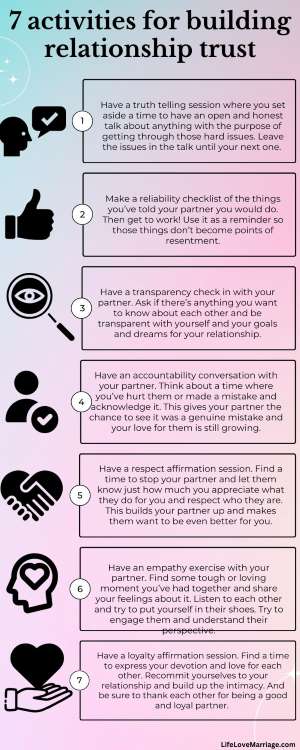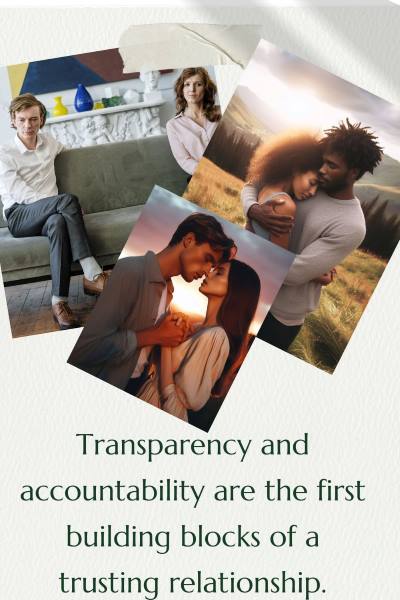7 pillars of building trust in a relationship: with activities you can use today with your partner
Trust is one of the most fundamental parts of any relationship because it allows you to feel safe and secure with your partner. Trust also enables you to communicate openly, resolve conflicts effectively, and allows intimacy to develop naturally.
Without trust, your relationship may suffer from doubt, fear, and resentment.
So how do you build trust in a relationship let alone maintain or restore it when trust has been broken?
In this article, I explore the concept of trustworthiness and what I call its seven pillars: honesty, reliability, transparency, accountability, respect, empathy, and loyalty.
I also provide some practical tips and activities to help you start cultivating these pillars in your relationship today.
What Is Trustworthiness?
Trustworthiness is the level of trust someone can place in you and it means that you act in a way that demonstrates your integrity and dependability.
It’s something that has to be earned and built naturally in a relationship. It can’t simply be asked for or demanded. And the science is clear, it’s an essential thing for happy and healthy relationships.
And our trustworthiness isn’t a static or some kind of one-time attribute. It is a dynamic thing that requires attention and effort. The trust and trustworthiness of your relationship is something that is directly made by your actions and behaviors.
Which means it’s something we can actively work towards building together.

The 7 Pillars of Trustworthiness
According to Stephen M.R. Covey, the author of The Speed of Trust, trustworthiness can be divided into two general dimensions: character and competence.
Character refers to your intrinsic values and what kinds of things motivate and inspire you..
Competence refers to your actual experience, skills and knowledge. And both of these are needed for building genuine trust in a relationship.
Research over the years into relationship dynamics has found 4 different attachment styles and that the styles partners have dramatic affects on the feelings of trust in the relationship.
Based on this research and the works of authors like Covey, I propose the 7 pillars of relationship trust.
These are the necessary things that hold up the trust within your relationship.
Honesty
Honesty means telling the truth, admitting your mistakes, and avoiding deception or manipulation. In a relationship it shows that you are sincere and trustworthy, and it helps to build a truly secure attachment with our partner. Honesty builds trust in a relationship through our commitment and our actions.
Having an honest relationship is the ultimate goal. It’s a relationship where you can both be authentically yourselves and trust fully in your partner.
Reliability
Reliability means keeping your promises, fulfilling your commitments, and meeting your deadlines. Reliability shows that you are dependable, responsible, and trustworthy. Reliability also means being punctual, organized, and prepared. Reliability builds trust by creating predictability, stability, and security in a relationship.
Transparency
Transparency means sharing relevant information, expressing your feelings, and disclosing your intentions. It shows that you are open, clear, and trustworthy. And those partners who can be more open often have higher ability to cope with stressors in the relationship. Transparency also means being receptive to feedback, questions, and suggestions. Transparency builds trust by reducing uncertainty, ambiguity, and confusion in a relationship.
Accountability
Accountability means taking responsibility for your actions, outcomes, and impacts. Accountability shows that you are honest, reliable, and trustworthy. It also means apologizing when you make a mistake, offering to make amends, and learning from your errors. Accountability builds trust by demonstrating integrity, humility, and growth in a relationship.
Respect
Respect means valuing, appreciating, and honoring your partner, their individuality, differences, and boundaries. Respect shows that you are caring and considerate of their feelings. It also means listening attentively, speaking politely, and acting courteously. Respect builds trust by fostering mutual understanding, acceptance and admiration in a relationship. Higher levels of respect between partners has also been found to lead to relationships with higher levels of satisfaction.
Empathy
Empathy means understanding, sharing, and responding to your partner’s emotions, needs, and perspectives. Empathy shows that you are compassionate, supportive, and can be attentive, affectionate, and comforting. Empathy builds trust by creating emotional connection, closeness, and intimacy in a relationship.
Loyalty
Loyalty means being faithful, devoted, and committed to your partner. Loyalty shows that you are trustworthy, protective, and trustworthy. Loyalty also means being honest, reliable, and respectful even when your partner is not around. Loyalty builds trust by enhancing security, confidence, and stability in a relationship.

You can download a free HD printable version of the infographic here.
How to Build Trust in a Relationship: Tips and Activities
Building trust in a relationship is not easy or quick. It takes time, effort, and patience from both partners.
However, there are some tips and activities that can help you cultivate the seven pillars of trustworthiness in your relationship:
Be honest with yourself and your partner.
Honesty is the single greatest part of the foundation a happy relationship. If you want to build trust, you have to be honest with yourself and your partner about your feelings, needs and expectations.
You also have to realize that a part of building true trust is being honest when we make a mistake and taking responsibility for what we’ve done. And of course, forget lying about anything. It doesn’t if it’s something as small as saying an outfit looks good or as big as infidelity, lying only makes something bad worse.
Activity: Have a truth-telling session with your partner. This is something my wife and I have done for years in the way of having a set monthly time where we come together and talk about anything that is on our minds in a totally open and honest way.
And that’s where it stays if it’s a genuinely real issue until the next talk. It opens your communication to the point where, as we’ve grown it’s something that’s no longer needed or even remembered because open and honest communication has been built up over the years. Share something deep the first few times and listen to your partner with empathy.
Be reliable and follow through with your actions.
You can think of reliability kind of like the evidence of trust in a relationship. If you want to build trust, you have to keep your promises and fulfill your commitments. It takes effort to follow through on simple things we’ve said when real life is putting things in our way but that’s how you build reliability between you and your partner.
It’s not the huge events or moments, it’s the small day to day commitments and promises you make that have to be kept in order to build up that sense of mutual reliability in your relationship. In fact, reliability and attachment anxiety have been found to be closely related in romantic relationships.
Activity: Make a list of things that you have promised or agreed to do with or for your partner. It could be something big or small, such as taking out the trash, planning a date night, or saving money for a vacation.
Review the list and check if you have completed or are working on each item. If you haven’t, make some sort of plan to see it through. The small promises you make and don’t get around to following through with are the things that poke holes into the bottom of your partner’s heart and slowly drain the love.
Be transparent and share relevant information.
Transparency is how open you are with your partner and it’s a good measure of the trust in a relationship. If you really want to build trust, you have to be willing to share things with your partner and to accept their feedback when they give it to you.
This can be hard at first but if you are both coming at each other from the perspective of being honest and helpful for your partner, there isn’t anything to worry or get angry over. Don’t try withholding your feelings or trying to distort how you come across to your partner. Tell them what’s going on and let them see more of you. Building better relationship communication takes effort and being transparent is the very first step.
Activity: Have a transparency check-in with your partner. Ask each other if there is anything that you need or want to know more about each other. It doesn’t have to be something big, and the talk doesn’t even have to be a scheduled and formal thing.
Just find time to ask them what’s going on inside and see if there’s anything they want from the relationship or you. And then listen and try to answer them honestly as well. Lots of times we get asked questions we may not know the answer to. If you don’t know the answer or don’t feel comfortable sharing it, explain why and ask for more time or space. Express your gratitude for each other’s openness and curiosity.

Be accountable and take responsibility for your actions.
Accountability is the integrity of the trust in your relationship. To start building genuine trust between partners we have to be willing to fully take responsibility for the things we do, both good and bad, in our relationship. It’s only from there can we ever really change the bad and grow those good things.
You also have to apologize when you make a mistake, offer to make amends, and learn from your errors. Don’t blame, justify, or rationalize your actions because all that does is make the rift bigger because you’re trying to avoid responsibility. Don’t ignore, minimize, or deny the harm that you have caused to your partner. Let your behavior show that you’re honest, reliable and trustworthy.
Activity: Have an accountability conversation with your partner. Think about a time where you made a mistake or hurt your partner in some way. It doesn’t have to be huge like infidelity, just a time when you know they were kind of hurt.
Acknowledge what you did wrong and how it affected your partner and then apologize and ask what you can do to make it up to them. With most things, especially small ones, just the fact that you’re taking responsibility for it is more than enough to make up for it and that alone will have your partner’s heart melted.
Be respectful and value your partner’s individuality.
Respect is like the appreciation of trust in a relationship. Think about it, if you respect your partner are you going to do something that would harm the trust between you? No, just as your partner would never do that if they respect you.
Respecting our partner is a foundational thing in a romantic relationship and it goes deeper than the basic respect we show people just because they’re other human beings. Relationship respect is about truly appreciating what our partner brings to us and showing them that appreciation.
Activity: Have a respect affirmation session with your partner. Find a time to stop them and show them just how much you appreciate what they do and respect who they are. This is something my wife does often and every time, regardless of how little the thing she mentions, it fills me up with love and makes me want to be better for her. I think it hits men as an innate love language that we seek out from our partner.
And ladies, this is something that all men are moved and motivated by. Respect is something powerful for us and when we feel your respect it drives us like nothing else. Listen to your partner with your partner when they compliment you and express your gratitude.
Be empathetic and understand your partner’s emotions.
Empathy is like the connection of your trust in a relationship. If you want to build trust, or if you want to restore the intimacy, you have to understand and respond to your partner’s emotions. What their needs, perspectives and drives are. You also have to be attentive, affectionate, and comforting with your partner.
Never try to dismiss your partner’s feeling regardless of if they don’t make sense to you. Just recognize that they have them and their feelings are valid. When you come into a situation with your partner from a perspective of empathy you are showing them that their feelings matter to you. Research has also shown significant effects of open and empathetic communication on the long-term satisfaction and stability of romantic relationships.
Activity: Have an empathy exercise with your partner. Choose a situation that has caused you or your partner to feel a strong emotion, such as joy, anger, sadness, or fear. Take turns to describe the situation and how it made you feel.
Use active listening skills like “I” statements and avoid blaming or judging. Listen to your partner’s description and try to imagine how they felt. Try to really engage with them and validate their feelings. Just be sure to remember empathy and validation.
Be loyal and be faithful to your partner.
Loyalty is the security of trust in a relationship. Loyalty is the glue that holds everything else together. It’s the action and behaviors that act as a culmination of the feelings in your relationship for better or worse. Part of the honesty, reliability, respect and everything else I’ve talked about is showing them your loyalty with your actions.
Never entertain someone flirting with you, and don’t do things that single people do to find love like going to clubs with your friends. Instead make your behaviors like a sort of boundary that keeps you from ever even being in a situation where your loyalty is tested.
Activity: Have a loyalty affirmation session with your partner. Set aside some time together to express your love, devotion, and commitment to each other. Share one thing you appreciate and one thing you admire about your partner.
This builds up both how they feel about your love and reaffirms your love to yourself. Again, these don’t have to be huge things, or big displays of love. It just has to be you two sharing your feelings in an intimate moment. Thank each other for being loyal and trustworthy in your relationship.
Build the trust in your relationship and grow something that lasts a lifetime
By cultivating the seven pillars of trustworthiness: honesty, reliability, transparency, accountability, respect, empathy, and loyalty you can build a genuine trust that shapes your entire relationship into something amazing.
Remember, trust is a gift from our partner, but it’s one we have to earn and when we give it back to them, trust becomes a self fulfilling cycle of growing your relationship stronger and deeper.
Sign up for our free newsletter and get the latest articles, research, and great deals to keep your relationship growing.
You can find our latest articles below:
-

How the Presidential Election is Affecting Relationships
The election is just ramping up and with events like the attempted assassination, this election is affecting relationships like never before.
-

What to Do When Your Partner is Gaslighting in the Relationship
Gaslighting can make your relationship fall apart and bring your mental health with it. Here’s how to stop it before it starts.
-

How Men Gaslight Women in a Relationship
Gaslighting is something that can turn a good relationship into a living nightmare. Here’s how to recognize when it happens and what to do.
-

How Women Gaslight Men in a Relationship
Men, you need to be able to recognize when you are being gaslit by your woman. Here’s how and what to do about it to keep you safe and legal.
-

What is Gaslighting in a Relationship?
Gaslighting can turn a good relationship into a living hell, here’s what it is, and how to deal with it before the problems start.
-

Why Women Need to Start Approaching Men
Ladies you need to start approaching men and it is absolutely the #1 fastest way to catch that high quality man of your dreams.

2 responses to “7 pillars of building trust in a relationship”
I enjoyed reading your 7 pillars of building trust in a relationship. I completely agree with all of your points here. Transparency and honesty are the big ones for me. I’ve been married for 18 years, and this is so important.
Thanks Dana, I agree with your about transparency and honesty. I feel like these can build up our relationship so much and help avoid a lot of the potential pitfalls we get ourselves into, and my wife and I have also been married 18 years!